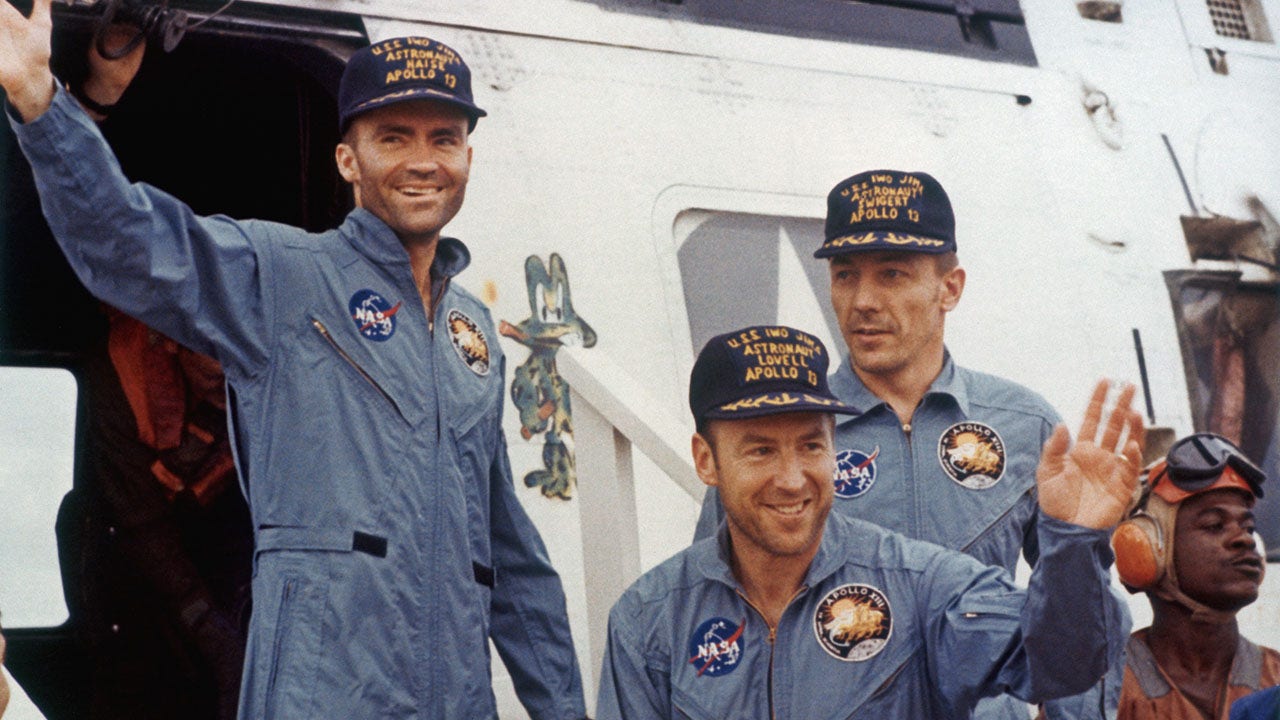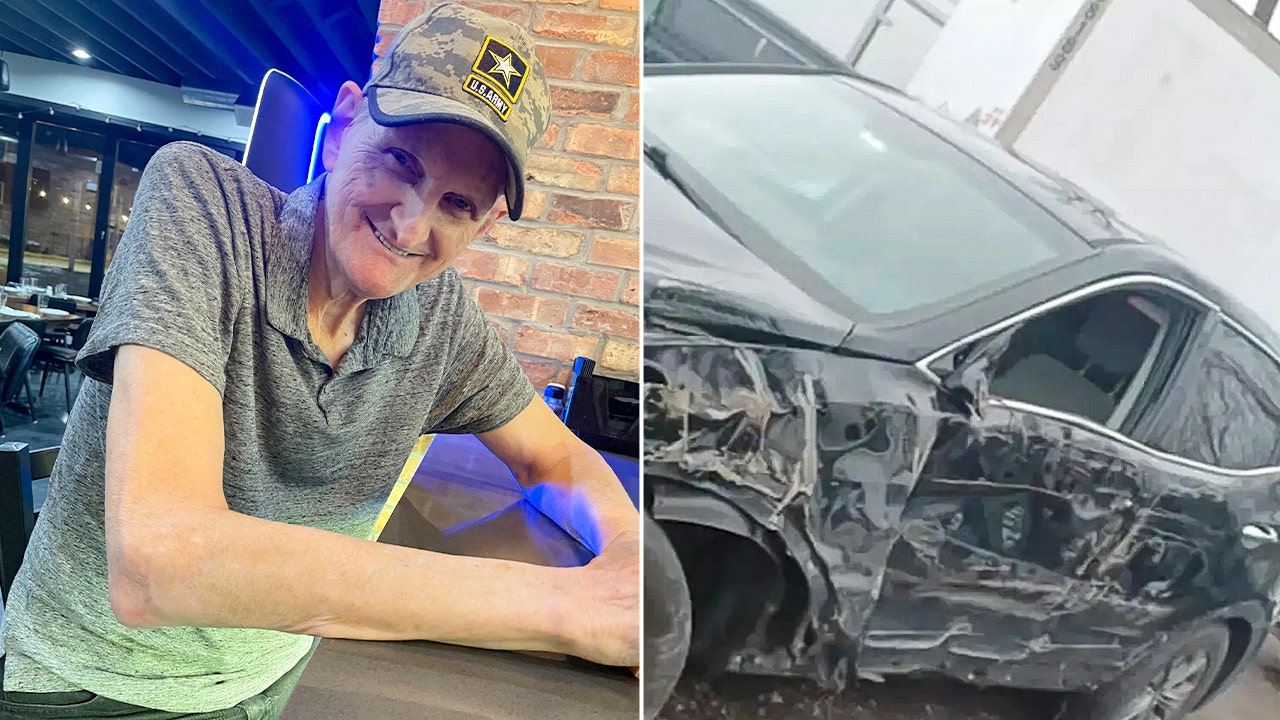An incredible human drama in space exploration ended with the miraculous safe return of the three Apollo 13 astronauts on this day in history, April 17, 1970.
“In Mission Control, pandemonium erupted,” NASA reports of the joy that overwhelmed the command center after the mission’s capsule splashed down in the South Pacific shorty after noon Central Standard Time, just four miles from rescue recovery ship USS Iwo Jima.
The fate of the three astronauts of Apollo 13 — Commander James Lovell, Command Module pilot John”Jack” Swigert and Lunar Module pilot Fred W. Haise — gripped the nation for three days after an explosion on board forced NASA to abort its third planned manned mission to the moon.
ON THIS DAY IN HISTORY, APRIL 16, 1889, FUTURE HOLLYWOOD LEGEND CHARLIE CHAPLIN IS BORN IN LONDON
“The Iwo Jima’s skipper, Captain Leland E. Kirkemo, and Rear Admiral Donald C. Davis, Commanding Officer of Task Force 130 the Pacific Recovery Forces, welcomed them aboard the ship,” states NASA.
“President Richard M. Nixon telephoned to congratulate them on their successful recovery.”
The safe return of the Apollo 13 astronauts after their lunar landing mission encountered technical difficulties, April 17, 1970. From left to right, Lunar Module pilot Fred W. Haise, Mission Commander James A. Lovell (front) and Command Module pilot John L. Swigert (1931-1982). (Space Frontiers/Getty Images)
The events that followed the frightening explosion 300,000 miles from Earth tested the mettle of America’s bravest explorers and the engineering and scientific talents of the best and brightest minds of the nation.
“Houston, we’ve had a problem here,” Apollo 13 command module pilot John”Jack” Swigert famously told NASA Mission Control three days earlier with incredible composure, moments after an oxygen tank exploded on board.
The astronauts had been startled suddenly by a sharp bang and vibration, then a warning light.
Swigert’s actual words were slightly different than the phrase, “Houston, we have a problem,” that has since entered the American cultural lexicon.
Bill Paxton, Kevin Bacon and Tom Hanks looking out the ship window in a scene from the film “Apollo 13” in 1995. (Universal/Getty Images)
But the enduring popularity of phrase ingrained in everyday conversation and pop culture is a testament to the grip the fate of the men had on Americans as breathless reports unfolded on national newscasts and local newspapers.
Just nine minutes earlier, the crew had completed a 49-minute TV broadcast back to Earth.
BIBLE EXHIBIT CHALLENGES BELIEF THAT FAITH AND SCIENCE HAVE NOTHING TO DO WITH EACH OTHER
“This is the crew of Apollo 13 wishing everybody there a nice evening … Good night,” Lovell said at the end of the segment.
Conditions changed quickly.
Navy swimmers fasten a flotation collar around the Apollo 13 capsule as it floats after splashdown in the Pacific Ocean. Aboard are James Lovell, John Swigert, and Fred Haise. (Getty Images)
“With warning lights blinking, one oxygen tank appeared to be completely empty and there were indications that the oxygen in the second tank was rapidly depleting,” writes NASA of the frightening chain of events.
“Thirteen minutes after the explosion, Lovell happened to look out of the left-hand window and saw the final evidence pointing toward potential catastrophe.”
Lovell reported, “We are venting something out into the … into space,” he reported to Houston.
FIRST MEN ON THE MOON, A UNIQUE AMERICAN ACHIEVEMENT, STILL AMAZES US TODAY
It was the mission’s supply of oxygen gas rapidly escaping.
NASA was forced to rewrite the book on space flight, literally, to get the men safely back to Earth.
Apollo 13 – NASA, 1970. Mission Control Center, Houston, Texas: Three of the four Apollo 13 flight directors applaud the successful splashdown of the Command Module Odyssey, April 17, 1970. Artist NASA. (Heritage Space/Heritage Images via Getty Images)
“Ground controllers in Houston faced a formidable task,” states NASA.
“Completely new procedures had to be written and tested in the simulator before being passed up to the crew.”
Mission control had to figure out how to stop the leak, conserve power and water and prevent carbon dioxide from filling the spacecraft and killing the men.
They also had to turn the mission’s Lunar Module, dubbed Aquarius, into a lifeboat — using the resources of the vehicle that was supposed to land on the moon to not only help the astronauts survive but then help guide the Command Module back to Earth.
CLICK HERE TO SIGN UP FOR OUR LIFESTYLE NEWSLETTER
“The navigation problem had to be solved; essentially how, when and in what altitude to burn the LM [landing module] descent engine to provide a quick return home,” states NASA.
The incredible survival of the astronauts has lived on as an example of American ingenuity and teamwork.
It inspired, among other chronicles, a Hollywood version of events, “Apollo 13,” in 1995, starring A-list actors Tom Hanks, Kevin Bacon and Gary Sinise. Ron Howard directed the film.
NASA deemed the mission a “successful failure.”
It failed to reach the moon, but all three men on board survived and the lessons of the technical failures helped improve the safety of future missions.
Writes Space.com, “The mission stands today as an example of the dangers of space travel and of NASA’s innovative minds working together to save lives on the fly.”
For more Lifestyle articles, visit www.foxnews.com/lifestyle.
Kerry J. Byrne is a lifestyle reporter with Fox News Digital.


